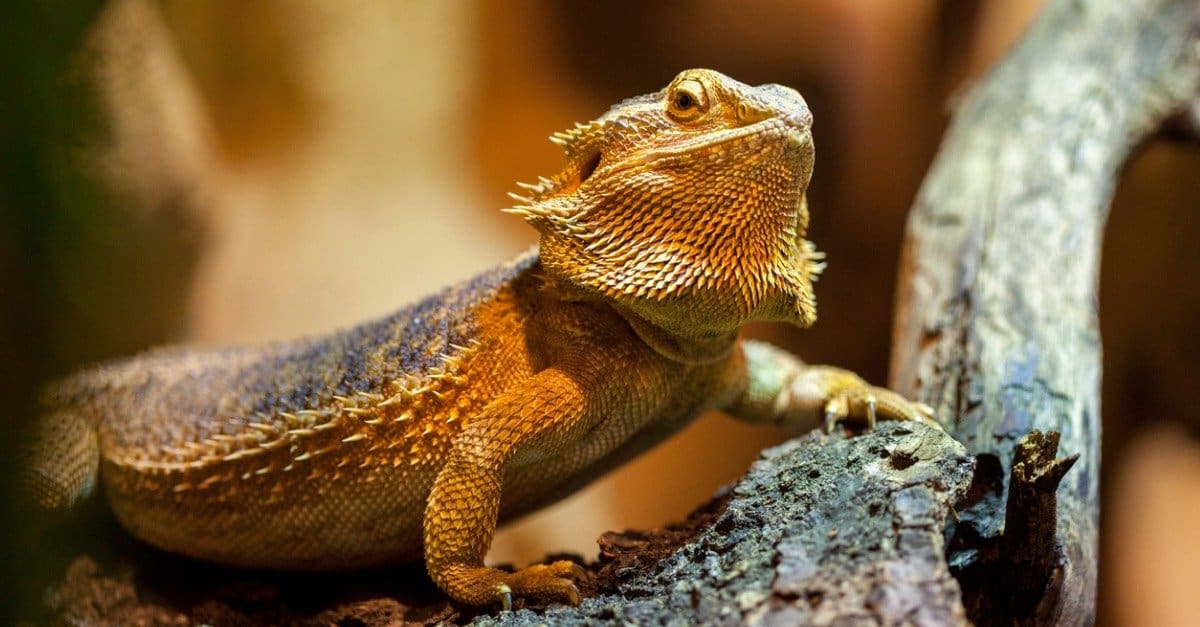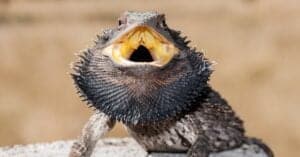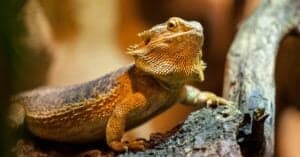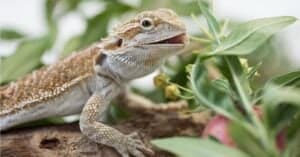Bearded dragons (Pogona vitticeps), affectionately known as beardies, live in deserts and other dry corners in Australia. They’re also one of the most popular reptile pets. All beardies share similar behaviors and physical appearances, but their environment often impacts their intelligence. So, how smart are bearded dragons? Keep reading to discover their mental abilities and how their surroundings play a role.
A Summary of the Bearded Dragons’ Mental Abilities
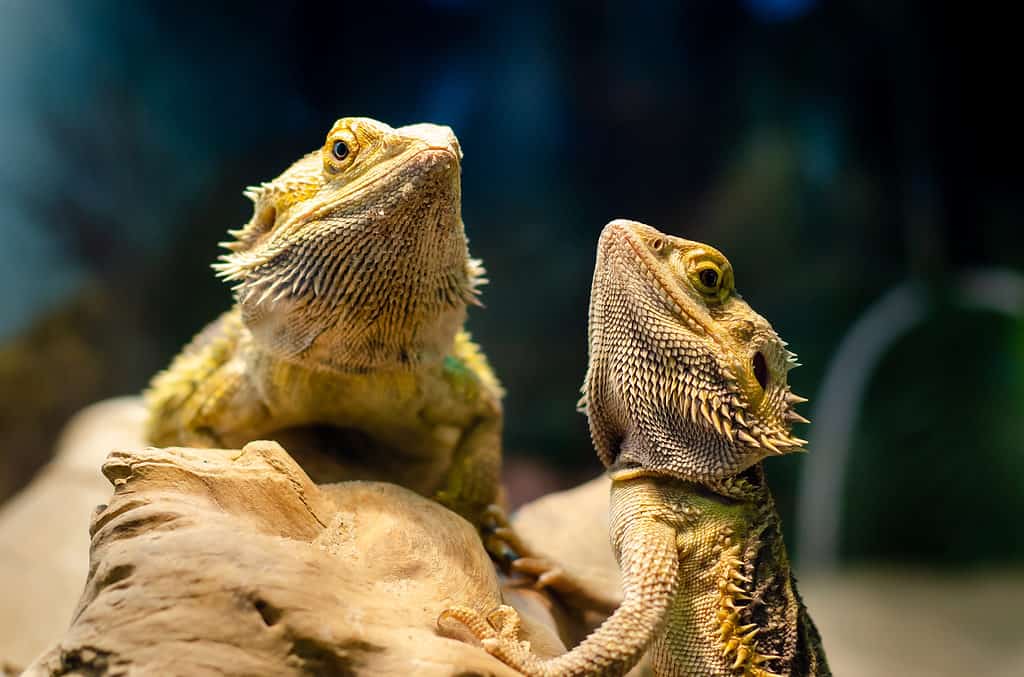
Beardies can bond with humans by cuddling.
©Lutsenko_Oleksandr/Shutterstock.com
Many reptiles are overlooked regarding animal intelligence because their personalities don’t appear as engaging. But reptile lovers know this isn’t true. Although they express their personalities differently than other common human companions, they have interesting and unique habits and behaviors.
Like the Kimberley rock monitor, beardies can bond with humans by cuddling. They recognize people through daily feedings and their smell or voice. They also remember routines and patterns and respond to different experiences. Bearded dragons even wave and head bob to one another in acknowledgment.
Bearded dragons display other learned behaviors depending on how they adapt to their environment, in a home, and in the wild. But how smart are bearded dragons overall? Below are some things that make bearded dragons intelligent, with scientific studies for in-depth explanations.
Cognitive Capabilities: Understanding the Bearded Dragons’ Problem-Solving Skills and Learning Aptitude
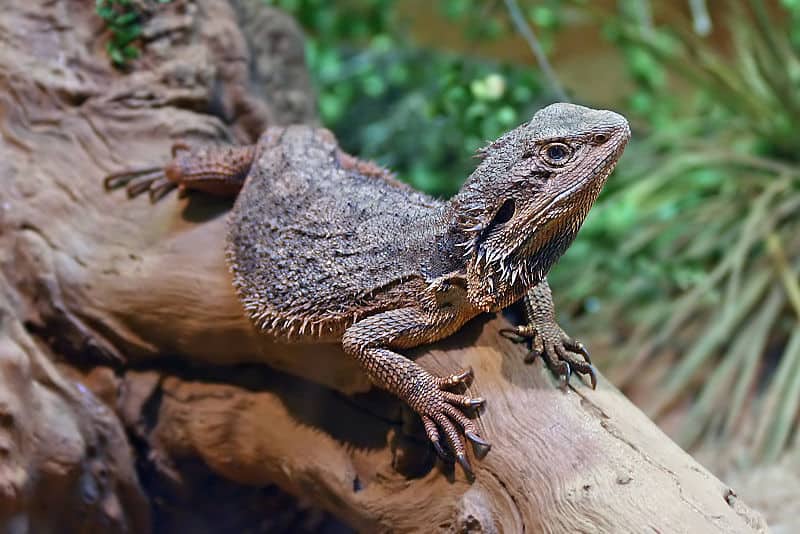
Beardies possess the skill of true imitation.
©John O’Neill / Creative Commons – Original
An adaptation that makes bearded dragons unique is their response to heat. In fact, they can regulate their metabolic function. This ability is particularly important because many of their behaviors are temperature-dependent. For example, their speed and need for food decrease when cold. Bearded dragons are ectotherms, meaning they rely on the environment for temperature regulation. That’s why choosing a good heat lamp for their tank at home is important.
Research shows that beardies control which parts of their bodies change color in response to heat and to communicate with other bearded dragons. But beardies can manage simultaneous color changes in different parts of their body. For instance, they change the color of their backs to regulate body temperature, while their chests change color during social interactions with other beardies.
Another interesting skill bearded dragons possess is true imitation. Rather than simply mimic the behavior of another bearded dragon, they learn and understand the intention behind the action. Researchers from the U.K. and Hungary tested this skill using 12 bearded dragons in a cognitive experiment. One acted as a demonstrator, teaching the group how to open a sliding door. Afterward, the beardie received a mealworm as a reward for opening the door. Like most animals, bearded dragons are food-driven. As a result, the experiment succeeded, and they learned how to open the door without any instinct or prior knowledge.
This experiment is vital in understanding bearded dragon intelligence because true imitation was once thought to be unique to humans and advanced primates, such as monkeys and apes.
Intelligence in the Animal Kingdom: Comparing Bearded Dragons to Other Species
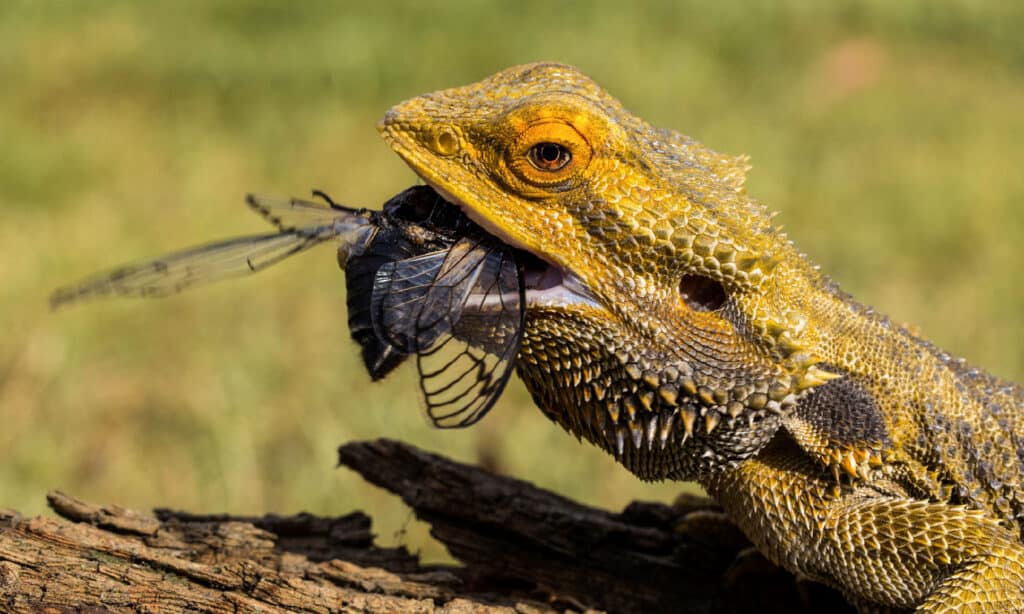
Bearded dragons aren’t the smartest reptiles, but they are incredibly adaptable.
©iStock.com/Ken Griffiths
How smart are bearded dragons compared to other animals? The intelligence of reptiles compared to one another and other animals is difficult to measure. We’re still learning how intelligent they are. However, research over the past few years suggests bearded dragons are more intelligent than previously thought.
One of the smartest reptiles is the king cobra. Unlike most snakes, they watch their prey, calculating the best time to strike. The giant tortoise is another example. They’re physically slow but quick-witted. They can distinguish different people and objects and retain learned skills for many years.
Other animals in the kingdom possess an even more comprehensive range of skills. Dogs have an IQ equivalent to that of a two-year-old child. Depending on their breed, they can learn tricks after only five repetitions and complete tasks with little human interference. Elephants are one of the smartest animals in the world. They have strong memories, but their complicated social structures, tool usage, and altruistic acts best represent their intelligence.
Although bearded dragons don’t possess the same skills as some of the smartest animals, they’re still intelligent. Their skills and mental abilities match their needs. Beardies adapt to their environment to survive and connect with other beardies, people, and other animal species.
Past Discoveries and Studies on Bearded Dragon Intelligence
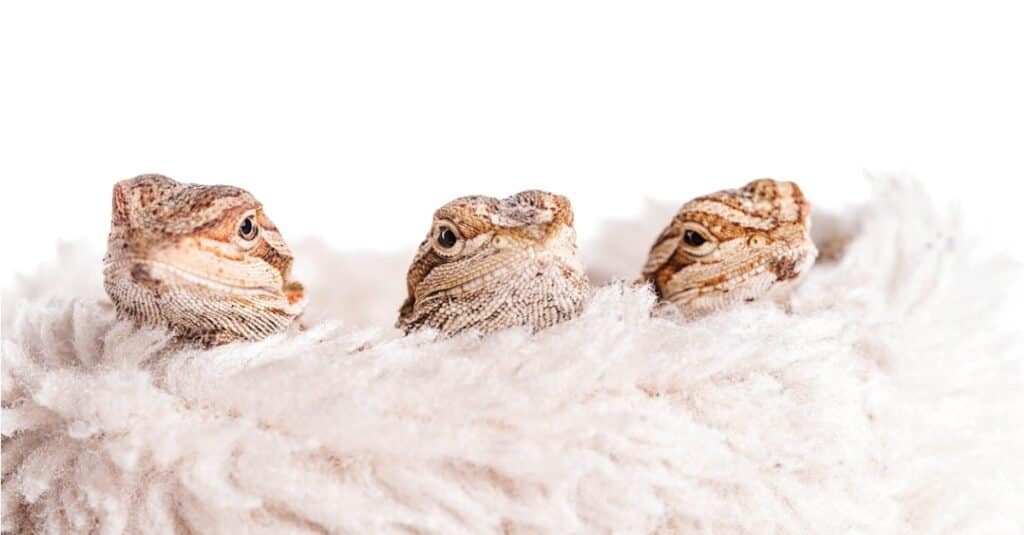
According to research, hatchling intelligence is most likely affected by incubation temperatures.
©iStock.com/Kaan Sezer
Scientists have discovered that many creatures are more intelligent than previously believed. One such animal is the bearded dragon. Researchers affiliated with the University of Lincoln in the United Kingdom studied the effects of global warming on the intelligence of bearded dragons. To test the effects, researchers incubated 13 eggs. Seven eggs were in a nest over 86 degrees Fahrenheit, while the remaining six eggs stayed in a nest at a standard 80.6 degrees Fahrenheit.
When the eggs hatched and the bearded dragons grew older, researchers tested their intelligence by showing them a video of a bearded dragon opening a sliding glass door. Then, they were tested to see if they could imitate the same behavior for a reward. The researchers reported that the lizards incubated in the warmer nest were less successful at mimicking the behavior than the beardies incubated in the cooler nest. Furthermore, those from the warmer nest mimicked the behavior more slowly.
Researchers suggest that increasing global temperatures can impact the intelligence of bearded dragons, thus making it harder for them to adapt to their environment. The findings indicate that egg incubation temperatures affect social learning in bearded dragons. However, it can also suggest that incubation environments alter the traits and adaptive needs of the environment in which they are born.
These results are similar to the study on the learning abilities of hatchling velvet geckos, which states that temperature can ultimately lead to lower survival rates and populations in the wild. More research is required to learn how these environmental changes impact bearded dragon intelligence.
Thank you for reading! Have some feedback for us? Contact the AZ Animals editorial team.

